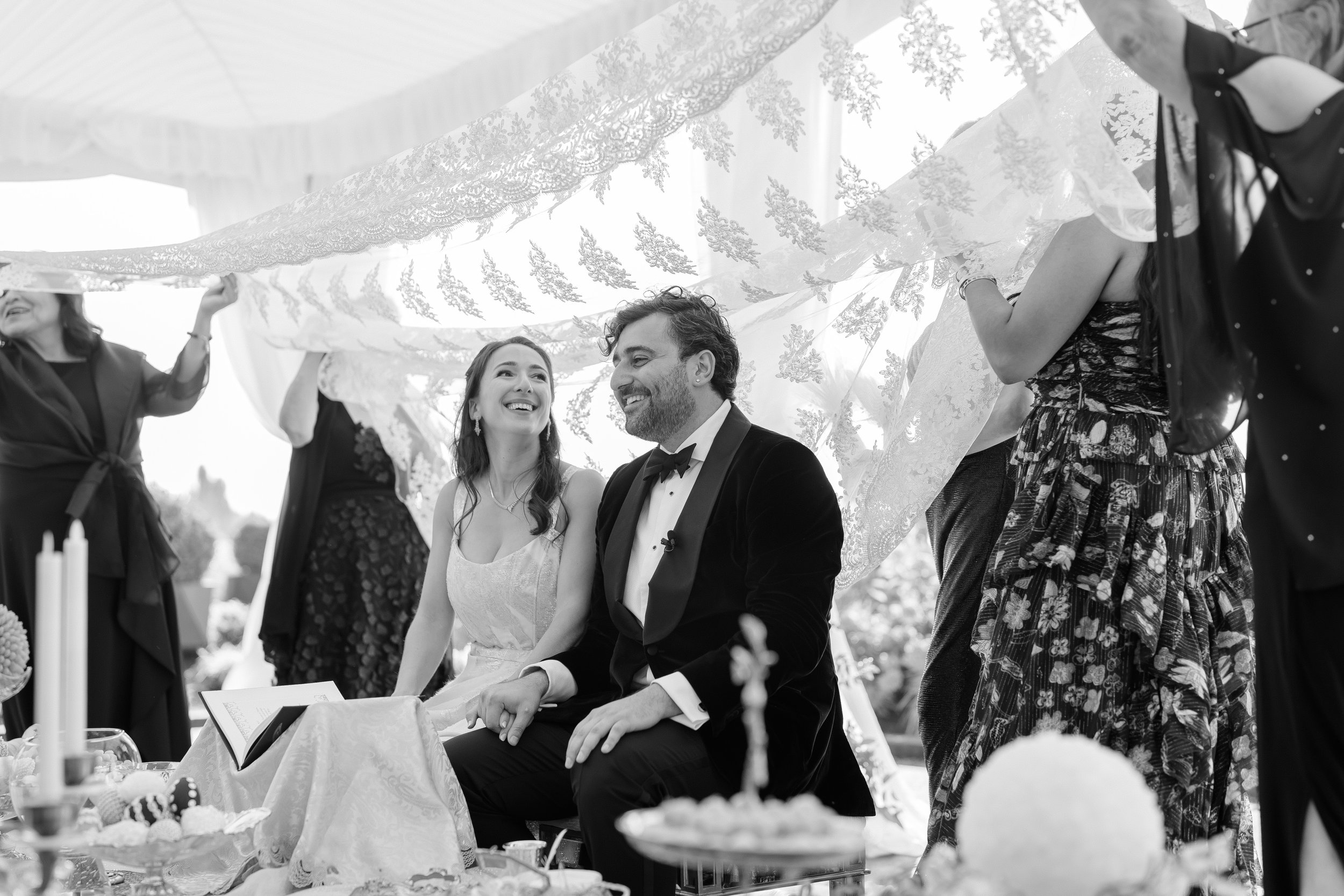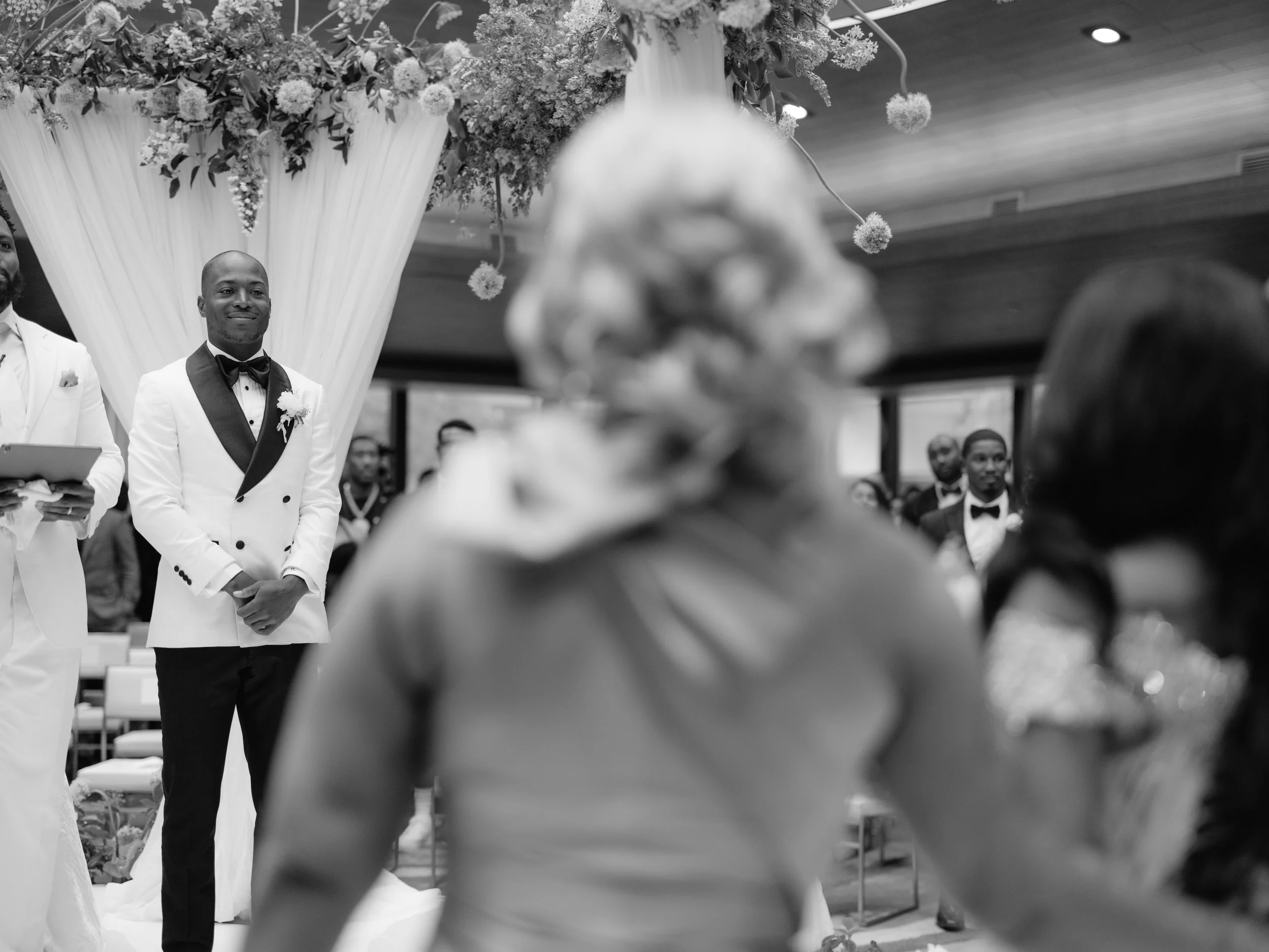Throwing a wedding celebration is one of the first times you and your partner will play “host” together, meaning your guests’ comfort and enjoyment is a top priority. From deciding who to invite to creating a welcoming atmosphere, navigating the intricacies of wedding guest etiquette can be a bit challenging. To assist you in this endeavor, we've compiled some of the most pressing questions you might be pondering, along with answers to help guide you.
Is it mandatory to send physical wedding invitations?
While the tradition of physical wedding invitations carries a certain timeless elegance, it is by no means mandatory in the contemporary landscape. Modern couples often opt for sending digital invitations, which are not only eco-friendly but also convenient for guests. The key is to ensure that the chosen method aligns with the formality and theme of the wedding. Whichever route you choose, clarity and thoughtfulness in conveying essential details should be the guiding principles.
Do We Have to Invite All of Our Guests With a Plus One?
While extending plus ones to all guests is considerate, budget constraints and venue space limitations may necessitate a more selective approach. In such cases, it's advisable to prioritize plus ones for guests in established relationships or those with a close friendship, fostering a balance between inclusivity and practicality. Decide where you’ll draw the line—for example, only guests in a long-term relationship can bring a date. Then, make sure the addressing on your wedding invitation envelopes is clear. For anyone invited with a guest, put the guest’s name on the invitation, too (i.e. “Ms. Jenny Granger and Mr. Keelan O’Keefe,” not “Ms. Jenny Granger and Guest”), to avoid any confusion.
For a guest invited alone, put only their name on the envelope (i.e. “Ms. Jenny Granger). If a single guest reaches out to ask if they can bring a plus one, let them know you either can’t afford to host a larger group or simply don’t have space at the venue — and leave it at that.
We Were Invited to a Friend’s Wedding—Do We Have to Reciprocate?
While there isn't a strict reciprocation rule, the decision to reciprocate should be based on the nature of your relationship with the couple and your own circumstances. If the couple was married recently, and you have both the space and the budget to accommodate them, it’s worth extending an invitation. If a considerable amount of time has passed or the relationship has faded, there's no need to feel obligated to invite them. Instead, craft plans that align with your budget and venue, and prioritize the people you really want to have there.
If some invitees can’t make it to our wedding, can we send out a second round of invitations?
Issuing a second round of invitations, while well-intentioned, may inadvertently convey a feeling of being secondary or less prioritized, especially when these invitations are delivered somewhat last-minute. To alleviate this concern, it's advisable for the secondary invitees not to be aware of their placement in the invitation sequence. If you learn early on that initial invitees cannot attend, it is entirely acceptable to send out secondary invitations, provided they are sent more than six months before the wedding. This timeframe gives the secondary invitees ample opportunity to plan their travel accommodations. Nonetheless, it’s crucial to refrain from initially informing a friend or family member that they aren’t being invited, only to later extend an invitation due to someone else's inability to attend. This approach ensures transparency and avoids potential discomfort or misunderstanding.
What Should We Do If We Need to Add Guests Last-Minute?
While it's generally advisable to steer clear of adding guests last-minute, unforeseen circumstances can arise, necessitating a personal and considerate touch. In such instances, reaching out directly to those you wish to invite with sincerity is crucial. It's important to recognize that some may find it challenging to attend on short notice.
For instance, suppose you recently sent out wedding invitations for an event scheduled a year and a half away. At the time of sending, a friend may have been single. Subsequently, they might have entered into a new relationship at the beginning of your engagement. Given the uncertainty of their relationship status for an event so far in the future, a gracious gesture would be to reach out a year later. Express that they are more than welcome to bring their partner to the wedding, even though a plus one was not initially mentioned on their invitation. This thoughtful communication ensures clarity and reflects your understanding of their evolving circumstances. Your friend and their partner would undoubtedly be extremely grateful for this considerate and understanding gesture, ensuring clarity and fostering an atmosphere of warmth and inclusion.
Do we need to arrange a wedding hotel room block for our wedding guests?
While not an absolute necessity, arranging a hotel room block for your wedding guests is a thoughtful gesture. It simplifies their accommodation logistics and, in some cases, can even lead to discounted rates. Negotiate with local hotels near the venue, keeping the convenience and comfort of your guests in mind.
Do we need to provide transportation for guests?
While transportation for guests is not obligatory, it can enhance their overall experience, especially if the venue is in a remote location. Consider the logistics and feasibility of providing shuttle services to and from the venue, ensuring the comfort and convenience of your attendees.
Are We Obligated to Invite Wedding Party Dates to the Rehearsal Dinner?
Inviting dates of the wedding party to the rehearsal dinner is a thoughtful practice, fostering a sense of inclusion. However, it is not a strict obligation. The decision should be based on your budget and preferences, ensuring a balance between hospitality and practicality.
How Should We Communicate That We Don't Want Gifts?
Since it is common for many couples to already be living together before marriage, they often don’t need a ton of household items like appliances and linens. Effectively communicating your preference for no gifts can be achieved subtly through your wedding invitations, wedding website, or through word of mouth. Emphasizing the importance of your guests’ presence over presents is key, expressing sincere gratitude for their attendance. This approach ensures that your guests feel valued, irrespective of their gift-giving decisions. Alternatively, you might consider setting up a charity registry for those guests who wish to express their love through presents—allowing them to make donations in your name. In the event a guest does choose to gift you something, graciously accept and extend your gratitude through a thank-you note, even if you don’t keep the item.
How Can We Include Friends Not in the Wedding Party at the Celebration?
Incorporating more close friends and family into your wedding festivities can be achieved through various means. Invite close friends, even if they aren't part of the formal wedding party, to join you early on the big day, allowing them to share in the preparation process or participate in pre-ceremony activities. Consider having them give a heartfelt toast, read excerpts during the ceremony, or showcase their musical talents by singing or playing an instrument during your wedding processional. These thoughtful gestures create meaningful roles for cherished friends, enhancing the overall celebration with personal touches and shared connections.
Do we have to have a wedding party?
Having a wedding party is entirely a personal choice. If you lean towards a more intimate celebration, you may opt to forego the formal wedding party. Alternatively, you could explore unconventional approaches, such as involving close friends in other roles that hold significance for you and your partner.
Do I have to pay for professional hair and makeup services for my bridesmaids?
While providing professional hair and makeup services for your bridesmaids is a thoughtful gesture, it is not mandatory. Budget constraints might necessitate a conversation with your bridesmaids to align expectations. Explore alternative options that balance their preferences and your budget.
Can we have a small ceremony with close friends and family, and then have everyone else attend the larger reception afterwards?
Absolutely. Opting for a small ceremony with close friends and family followed by a larger reception is a wonderful way to balance intimacy and inclusivity. This approach allows you to share those cherished moments with your nearest and dearest before extending the celebration to a broader guest list.
We Are Having a Small Wedding—Can We Invite Everyone to the Rehearsal Dinner?
Certainly! There's no strict rule dictating which guests should be part of the rehearsal dinner. While it's customary to invite immediate family, the wedding party, and the officiant, if your budget and venue size permit, you're welcome to include the entire guest list. A contemporary trend involves combining the rehearsal dinner with a welcome party, offering guests a chance to mingle before the main event.
What is the traditional wedding ceremony processional order?
The traditional processional order typically involves the officiant, grandparents, parents, groom, groomsmen, bridesmaids, ring bearer, flower girl, and finally, the bride escorted by her chosen escort. However, variations are common, allowing for personalization based on cultural or individual preferences to create a ceremony that is uniquely yours.
Everyone’s family dynamics are different, and you should really opt for whatever is most comfortable for you.
How Do We Stop Guests From Taking Pictures During the Ceremony?
To prevent guests from taking pictures during the ceremony, be transparent and have your officiant announce your request to your guests before the ceremony begins. Some couples also set up a sign explaining that it will be an “unplugged” ceremony - with both of these tactics, hopefully your friends and family will honor your wishes.
We Don’t Drink Alcohol but Our Guests Do—How Should We Handle the Bar?
If you don’t consume alcohol, but would like your guests to have the option to do so, think about what beverages you are comfortable serving. Some couples opt to have wine and beer served alongside a selection of non-alcoholic beverages if they want to keep alcohol consumption to a minimum. Regardless of your choice, communicate it clearly beforehand to establish expectations, ensuring everyone is informed and accommodated.
How Do We Accommodate All of Our Guests' Dietary Restrictions?
Accommodating dietary restrictions involves proactive planning. Dedicate a section on the RSVP for guests to communicate their dietary preferences, and relay this information promptly to the caterer. This considerate and accommodating approach ensures that every guest feels valued and included in the dining experience.
If navigating individual dietary preferences seems overwhelming, consider food stations or a buffet-style dinner. This allows guests to choose dishes based on their preferences, facilitated by descriptive food labels, simplifying the process and enhancing the overall dining experience.
We Had a Falling Out With a guest During Our Engagement—Can We Disinvite Them?
Disinviting guests due to a falling out is a delicate matter. Assess the severity of the situation and its potential impact on your relationship. Engage in open and honest communication if necessary. If feasible, consider extending the invitation to maintain a sense of grace and avoid further strain.
In instances where the falling out was significant, it’s likely the individual(s) may choose not to attend anyway. If they do decide to show up, a simple greeting and cordial expression of gratitude for their presence suffices. After that, it is completely fine to not spend further time interacting with them on your wedding day, which is advisable to maintain a positive attitude about your wedding day.
Is It Okay to Send Thank You Notes Via Email?
This is one of the opportunities in life to express your gratitude through handwritten thank-you notes. Your guests invested time, money, and effort to celebrate with you. Show your appreciation and gratitude by writing a personalized thank you to each guest, noting how much you loved having them at the festivities and acknowledging any gifts. While it might require extra time, especially after the whirlwind of wedding planning, your guests will undoubtedly value and appreciate your sincere show of gratitude.






